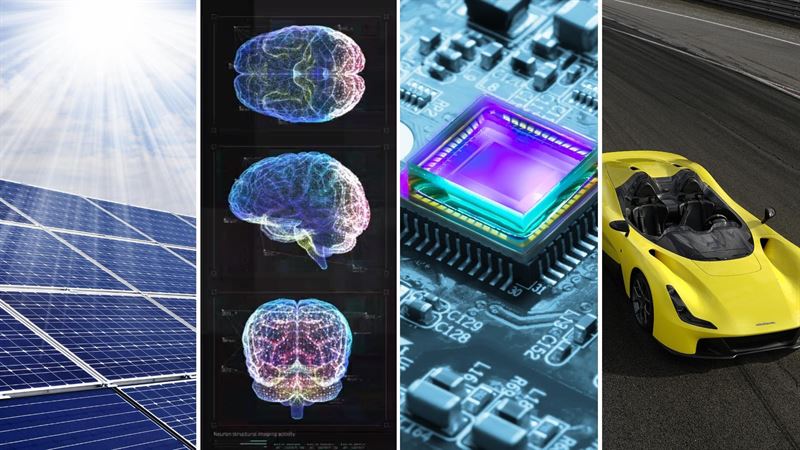| Aug 29, 2023 |
From lab to market: A look at graphene's societal impact
(Nanowerk News) Graphene Week, the Graphene Flagship’s annual scientific conference during 4–8 September, will feature an open pavilion showcasing graphene products and prototypes, a press conference, the Graphene Innovation Forum providing an industry perspective on graphene technologies, and more. During the event, some of the Graphene Flagship’s most successful projects will also be evidenced.
|
 |
| For ten years, Chalmers University of Technology, Sweden, has coordinated the EU's largest research project ever – the Graphene Flagship with a budget of 1 billion euros. Now it is time to highlight the journey of graphene, a single layer of carbon, from the lab to society. In addition to a large number of new products, patents and companies, the research project is estimated to produce over 38,000 jobs in Europe by 2030. (Image: Chalmers University of Technology)
|
|
The event announces the results of a highly anticipated economic impact report (PDF), published by the WifOR Institute. Figures include a 14.5-fold return on initial investment and the creation of and 81,000 jobs internationally by 2030. The key findings include significant contributions to gross domestic product (GDP) in Europe and €5.9 billion in gross value added (GVA).
|
|
These platforms will facilitate discussions of the past, present and future of graphene research and commercialisation in Europe – highlighting the project’s core successes as well as discussing the project's transition to the new Horizon Europe phase, the European Union’s (EU) key funding programme for research and innovation, where it will continue on with its research.
|
|
The programme of the 18th edition of the week-long conference includes over 200 lectures and sessions surrounding graphene fundamentals, applications, and production processes – celebrating a decade of activity in 2D materials innovation and commercialisation, and progress towards addressing some of the United Nations (UN)’s 17 Sustainable Development Goals, through graphene.
|
Presenting profound results stemming from the project
|
|
During the conference, Jari Kinaret, Graphene Flagship Director, will discuss what is next to come for the Flagship and will present the profound results stemming from the project. Other speakers will include Vincenzo Palermo, director of CNR-ISOF in Italy speaking on 2D composites production, Delphine Pommier from Thales TRT in France discussing graphene-based high-speed optoelectronics, and many more. Attendees can find the full programme here.
|
|
“We will be joined by over 400 participants from over 40 countries across the globe,” explained Jari Kinaret, Director of the Graphene Flagship. “Together we create an outstanding programme with over 200 talks, including five plenary sessions and eight parallel sessions. We are very lucky to be able to host this edition in Sweden, home of Chalmers University of Technology, which has been so imperative to this project’s success.”
|
|
Additionally, the Graphene Flagship welcomes the press and key decisionmakers to explore the Graphene Pavilion in Gothia Towers. The exhibition will showcase a sportscar made with graphene composites. Other graphene demonstrators will include a point-of-use water filter with hollow graphene fibres for filtering emerging contaminants, a graphene composite pipe with integrated sensors for fire and rupture detection and graphene-enhanced perovskite solar cells that are cheaper and more efficient than current state of the art panels.
|
|
Graphene Week provides an opportunity to demonstrate the successes of the project and the mark it will leave on Europe’s industry.
|
|
To attend the press conference or event, contact [email protected]
|
The Graphene Flagship celebrates a decade of 2D materials innovation
|
|
Funded by the European Commission in 2013, the Graphene Flagship, hosted by Chalmers University of Technology, Sweden, has brought graphene innovation out of the lab and into commercial applications. Bringing diverse competencies from nearly 170 academic and industrial partners in 22 countries together, the Graphene Flagship facilitates cooperation between its partners, accelerating the timeline for industry acceptance of graphene technologies.
|
|
With applications in everything from energy and transportation to electronics and biomedicine, graphene and other 2D materials are changing the way we live and work. The European Commission’s FET Flagships enable research projects on an unprecedented scale. With €1 billion budgets, the Graphene Flagship, Human Brain Project and Quantum Flagship serve as technology accelerators, helping Europe to compete with other global markets in research and innovation. With an additional €20 million investment, the European Commission has now funded the creation of an experimental pilot line for graphene-based electronics, optoelectronics and sensors.
|

